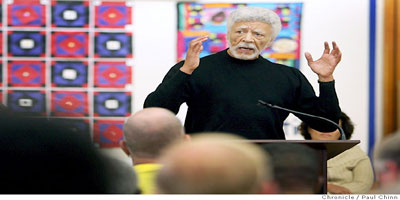PNN re-ports and sup-ports on Young Men of Color in Crisis panel.
 |
|
by Sam Drew/PNN “We are grinding young men of color up like glass. Every institution in our community is failing young men of color,” said Ron Dellums Mayor of Oakland regarding the sinking position of young men of color in the United States. He was speaking at the “Men and Boys of Color in Crisis” panel and discussion at the Youth Uprising Center in East Oakland. I attended the event to report and support for POOR Magazine. Listening to him speak, I couldn’t help remembering my bus ride in Oakland earlier that day. While on the packed bus, I noticed a young African-descendent male sitting a few seats in front of me. He was staring impassively at no one in particular during our bumpy ride on the unpaved streets of Oakland. As the bus began to fill up, older passengers began approached the youth decked out in a dark hoodie, brightly colored jeans and a blank stare, but no one would sit next to him. Time and time again someone would approach him, give him the once over and then decide to sit or stand somewhere else. He reacted to this rejection by distancing himself and not making eye contact with anyone. His body language exuded an “I don’t give a damn attitude.” This mutual coldness continued for most of the overly long ride. It was odd to see one open seat in a loaded bus with plenty of standing passengers. Finally, one new rider bucked the trend and forced her way to the seat. After a few minutes of emotional distance, the young man suddenly bolted from his seat for no apparent reason. But the reason soon became clear when an old man with a cane took the seat the young man had graciously given up. The vision of this young man on the bus remained in my thoughts, as I listened to the powerful speakers at the day’s panel. “I believe the problem of the city is the unfinished business of this country. It’s one thing to integrate a lunch counter. It’s another thing to have money to buy lunch,” quipped Dellums about the lack of economic opportunities facing many young men of color. According to a report of the Children’s Defense Fund. Black and Hispanic workers holding the same educational credentials as white workers experience higher unemployment rates. Harvard Law School Professor of Law, Charles Ogletree moderated between panelists and concerned citizens seeking ways to correct decades of neglect and criminalization. Chris Robinson, a film and video director said, “It’s not an us or them conversation… it is interdependence. You sink or swim with us. We pay much less to educate a child than to incarcerate a child.” According to the Children’s Defense Fund, a black boy born in 2001 has a 1 in 3 chance of going to prison in his lifetime: a Latino boy a 1 in 6 chance; and a white boy a 1 of 17 chance. Black juveniles are about four times as likely as their White peers to be incarcerated. Black youths are almost five times and Latino youths are more than twice as likely to be incarcerated as White youths for drug offenses. Today, 580,000 Black males are serving sentences in state or federal prison, while fewer than 40,000 Black males earn a bachelor’s degree each year. Two of the most searing comments came from exceptional young men of color that many in the audience could identify with. Both men spoke about the importance of family. Alfred Johnson, a father, Oaklander, and YouthUpRising member proudly said, “Being a parent is the cornerstone of our community. Being a parent isn’t taught in school.” While Tito Rodriquez told the audience that “Children are a blessing from God…the best way to teach them is not to point them in the direction, but walk beside them.” Both of these positive and powerful role models have faced the typical roadblocks most boys and men of color deal with everyday. Tito was profiled by the police on his way to the meeting and Alfred is struggling raising his 3-year-old with his landscaping job with the City of Oakland. Dr. Henrie Treadwell, Director of Community Voices and the associate director of development at the National Center for Primary Care at Morehouse School of Medicine, summed up the problem this way, “The Criminal Justice System is a reflection of what is wrong with our system. Policies are taking men out of the household and [putting them] into the prisons…It’s time for amnesty.” Joe Brooks, Vice President for Civic engagement at Oakland-based Policylink, wrote these positive ways for beginning the healing process, “We must find more effective ways to connect these boys into the social networks that help them succeed…We need our boys to grow into full, well-rounded, able men. But to do that, they need more than a one-time math tutor or a free asthma inhaler. They need a society geared toward helping them overcome the hurdles that were thrown at their feet even before they were born…By joining together under a single banner, Bay Area advocates can ensure these boys return to lift up their communities and start a new cycle of hope.” |



